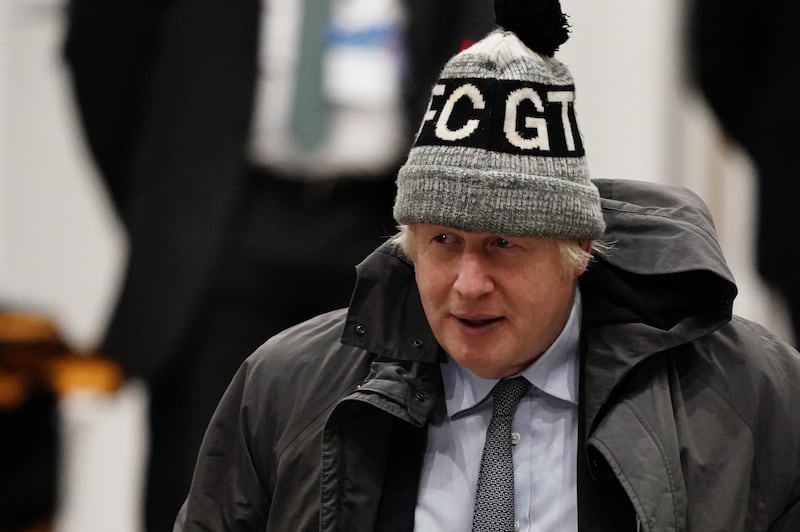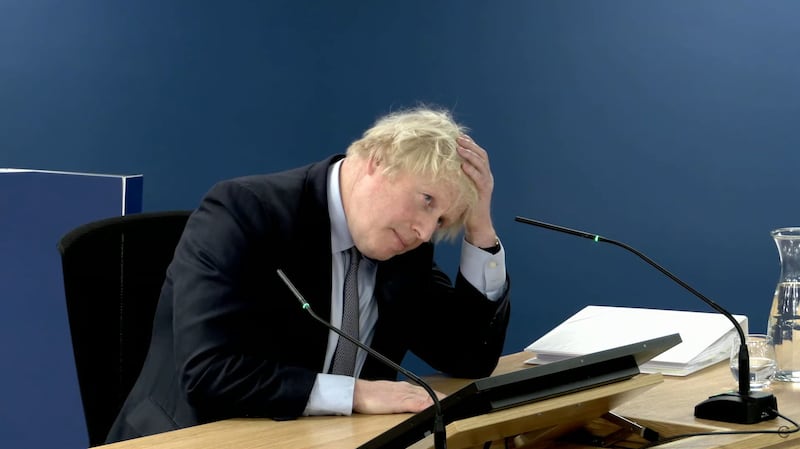The daughter of a Co Antrim teacher and musician who died after contracting Covid said she does not accept Boris Johnson's apologies delivered at the public inquiry into the response to the pandemic.
The former prime minister's "words nothing to me of the bereaved families in Northern Ireland", said Catriona Myles, whose 67-year-old father Gerry McLarnon died just before Christmas in 2020. Mr McLarnon was a father-of-three and grandfather to seven.
Members of his family were unable to see the dying man after he was admitted to hospital in late November that year. Between his admission to hospital and death on December 23, several parties were held in 10 Downing Street and other government offices.

"Ultimately, actions speak louder than words and we all know Boris Johnson's actions and inaction have meant thousands of us have been left with profound, traumatic, grief," Ms Myles told BBC NI.
Ms Myles told the inquiry in October her family believes Mr McLarnon could have been treated for a liver cancer diagnosis if he had received medical attention sooner.
He had difficulty with securing medical appointments due to lockdown restrictions, Ms Myles said. When diagnosed in late November, Mr McLarnon immediately had to be taken to hospital, where he contracted Covid.
In an ideal world, Mr Johnson would be open and transparent and "hold up his hands" to admit he was wrong, but his testimony to the public inquiry was "bluster", Ms Myles said. She was "disgusted" when details of the parties were first revealed.

Mr Johnson admitted he should have "twigged much sooner" about the threat posed by Covid-19 in the early days of the pandemic, as he apologised for "the pain and the loss and the suffering" of its victims.
The first day of the former prime minister's evidence to the UK Covid Inquiry, which was hit by protests, also saw him defending the culture of his No 10 after other witnesses branded it "toxic".
Read more: Johnson said he wanted a ‘disputatious' No 10 amid claims of ‘toxic' culture
Read more: Covid victim's daughter tells inquiry of disgust over Downing Street parties
He rejected accusations he had shown poor leadership by oscillating over whether to back tough restrictions in the early months of 2020.
Former aides have blamed Mr Johnson's tendency to veer on key decisions in March of that year for delaying the lockdown.
But he argued it was his job to "test" the "completely novel policy", adding: "It matters to the livelihoods of people up and down the land. I had to go through the arguments and that is what I was doing."
Challenged over the slow response to the unfolding crisis, Mr Johnson said Whitehall "underestimated" the need for action, adding that it was only when he saw the "horrors" of the outbreak in Italy that he realised the seriousness of the virus.
He suggested the experience of previous diseases such as Sars, Mers and swine flu clouded officials' judgement, while a coronavirus pandemic was "outside our living experience".
Mr Johnson did not deny questioning why his government was "destroying everything for people who will die anyway soon", but suggested the comment was not "designed to be publicly broadcast".
"It's an indication of the cruelty of the choice that we faced and the appalling balancing act that I had to do throughout the pandemic," he said when asked about a note written by his former aide Imran Shafi which recorded that he had made the remark.
He said he regretted describing long Covid as "bollocks" and "Gulf War Syndrome" in October 2020 notes, acknowledging the "hurt and offence" caused to those suffering from the condition.








